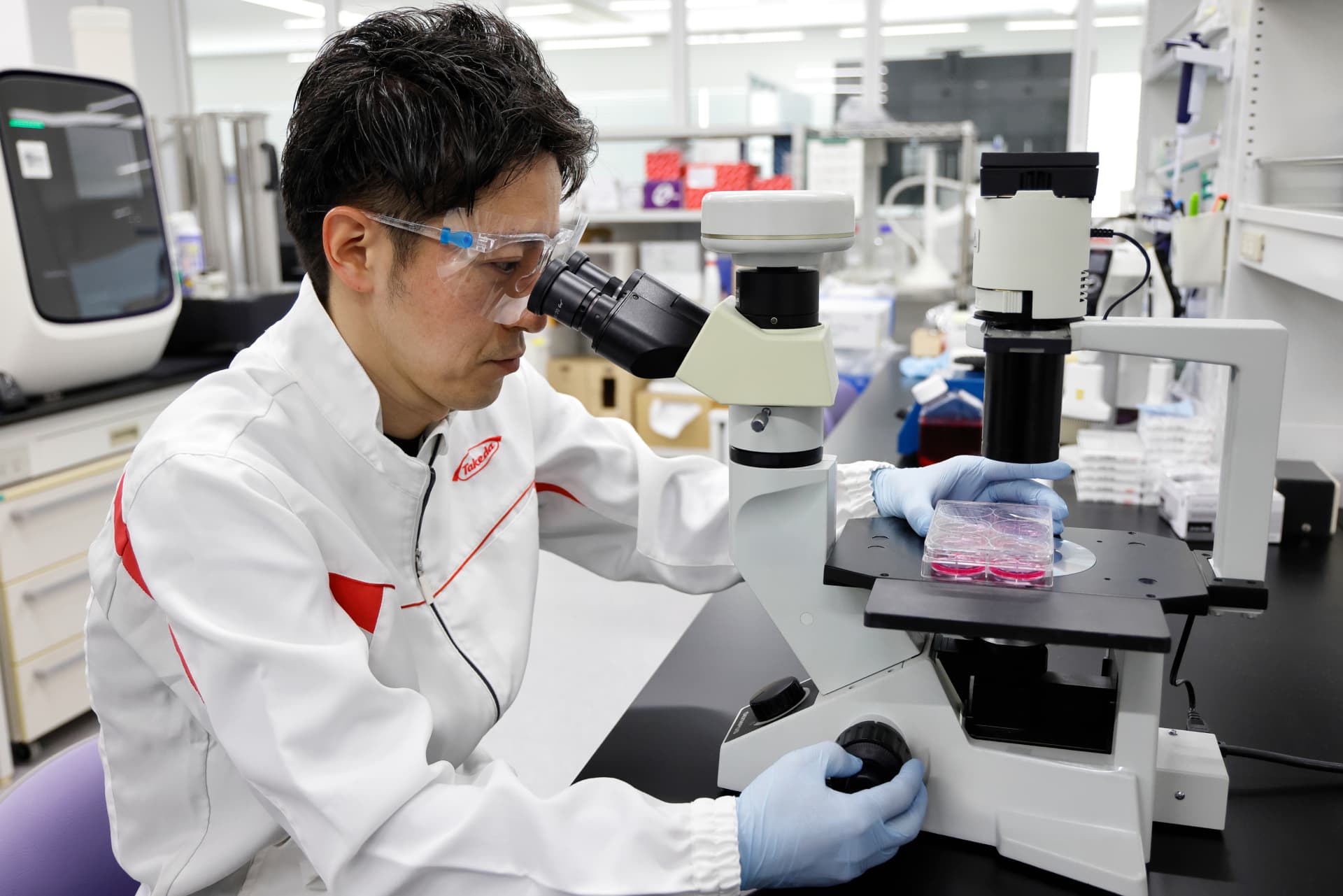Aiming to stop Crohn's disease before it starts | Takeda Stories

Collaborative study aims to stop Crohn’s disease in its tracks
Everyone’s experience with inflammatory bowel disease can be different. The information in this article is for disease awareness only and is not medical advice. Always consult a health care professional for medical advice, diagnosis and management options.
INTERCEPT explores how biomarkers may help detect risk earlier and transform patient outcomes through timely intervention.
Professor Geert D’Haens* from Stichting Amsterdam University Medical Center estimates he has treated more than 15,000 patients with inflammatory bowel disease over his 30-year career. That’s three decades of witnessing people suffer the pain, social difficulties, and often psychological trauma of a chronic and incurable condition. Now, however, professor D’Haens is leading a project that could not only deepen understanding of Crohn’s disease and revolutionize the treatment landscape, but potentially even prevent the disease before it starts.
“This project feels like it could lead to the most significant scientific progress in the field since the initial description of the disease by Burrill Crohn in 1932.”

Professor Geert D’Haens, INTERCEPT project coordinator, Stichting Amsterdam UMC (AUMC)
“I can genuinely see a future where Crohn’s is not just highly manageable, but avoidable,” he says. “This project feels like it could lead to the most significant scientific progress in the field since the initial description of the disease by Burrill Crohn in 19321 .”
Professor D’Haens is talking about INTERCEPT, a multinational, public-private partnership initiative of which he is Project Coordinator in collaboration with Professor Jean-Frédéric Colombel* at the Mount Sinai Hospital in New York. The groundbreaking study will use biomarkers – measurable substances found in bodily fluids, which can signal the presence of a medical condition before it clinically manifests – to identify the presence of very early-stage Crohn’s disease.
The biomarker approach has already been pioneered in other inflammatory conditions, such as type 1 diabetes and rheumatoid arthritis. Predicting who is at risk for Crohn’s would help health care professionals diagnose the disease early and allow appropriate interventions before the condition progresses to a debilitating stage.
“While I’ve witnessed major advances in the medication and therapeutic treatments for Crohn’s over the years, too many people still endure waves of remission and flare-ups,” Professor D’Haens says. “Every day I see patients, increasingly children and young adults, who have no energy to study or work because of the disease.

“If we can develop biomarkers to detect Crohn’s in the preclinical phase and validate them across multiple populations, we could diagnose long before symptoms develop. We would then be able to intervene with the appropriate management and care accordingly.”
INTERCEPT is a five-year initiative, funded by the European Union’s Innovative Health Initiative Joint Undertaking (IHIJU). Takeda is one of 21 collaborative partners from Europe, North America and South Korea.
The project aims to verify and clinically validate what is described as a ‘panel’ of biomarkers, then build a blood risk score that can identify individuals with a high risk of developing Crohn’s. INTERCEPT aims to recruit 10,000 healthy, first-degree relatives of Crohn’s patients from seven European countries, to further validate the biomarkers and risk score. From this group, 100 people with the highest risk will take part in an innovative trial – one designed to prevent disease development using established and highly effective medical treatment. Results from this study, which aims to reveal whether biomarkers are indeed good predictors of who will develop Crohn’s and whether early intervention or management can prevent disease development, are expected in 2029.

Awny Farajallah MD, Takeda chief medical officer
Takeda was approached to take part in INTERCEPT because of its expertise, and what Professor D’Haens describes as the company’s “vision to contribute to the field.”
Awny Farajallah MD is chief medical officer of Takeda, which is serving as the Industry Lead for INTERCEPT. He is driven by personal experience to serve in this capacity. “I frequently saw the impact of complications with Crohn’s when I was in clinical practice,” he explains. “I particularly remember one young man who spent months in hospital. He had a huge abscess and needed numerous rounds of surgery. If we can prevent people like him ever getting near that point, it would be amazing.”
Dr. Farajallah believes that uniting private and public expertise and resources is a critical pathway to drive Crohn’s research, ultimately contributing to the company’s commitment to advance innovative science and improve patient outcomes.
“Altering the course of Crohn’s disease, which would improve the lives of patients and their families as a result, involves complex scientific challenges that no one organization can address alone,” he says.
“We have considerable experience in inflammatory bowel disease at Takeda and are dedicated to improving IBD patient care as a top priority. So, we are delighted to be working collaboratively with our partners in this project, not only to intercept Crohn’s and transform care, but also to reinforce the concept that diseases like this can be prevented.”
You can find out more about INTERCEPT here.
*Has served as consultant for Takeda.
References
Crohn’s & Colitis Foundation. A Look Back at Our Beginning. Crohn’s & Colitis Foundation. Accessed October 2, 2025. https://www.crohnscolitisfoundation.org/about/our-beginning.
GBD 2017 Inflammatory Bowel Disease Collaborators. Lancet Gastroenterol Hepatol 2020; 5: 17–30. https://doi.org/10.1016/ S2468-1253(19)30333-4.
Long D. Biomedicines. 2024; 12:689. Barberio B, Zamani M, Black CJ, Savarino EV, Ford AC. Lancet Gastroenterol Hepatol 2021; 6: 359–70. https://doi.org/10.1016/ S2468-1253(21)00014-5.
Barberio B, Zamani M, Black CJ, Savarino EV, Ford AC. Lancet Gastroenterol Hepatol 2021; 6: 359–70. https://doi.org/10.1016/ S2468-1253(21)00014-5. GBD 2017 Inflammatory Bowel Disease Collaborators. Lancet Gastroenterol Hepatol 2020; 5: 17–30. https://doi.org/10.1016/ S2468-1253(19)30333-4.
C-ANPROM/INT/ENTY/0275 | October 2025
About inflammatory bowel disease
Inflammatory bowel disease (IBD), which includes Crohn’s disease as well as ulcerative colitis, affects more than 6 million people worldwide2. Symptoms can include3,4:
- Fatigue
- Diarrhea
- Stomach pain
- Weight loss
- Increased risk of complications such as cancer
- Mental health challenges such as depression
Share this story


